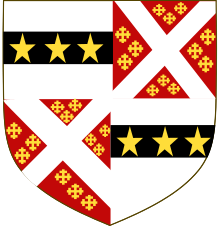Earl of Plymouth
Earl of Plymouth is a hereditary British title of nobility awarded twice in the Peerage of England and once in the Peerage of the United Kingdom .
Awards
The title was first created on July 28, 1675 in the Peerage of England for Charles FitzCharles , an illegitimate son of King Charles II. The award was made along with the subordinate titles Viscount Totness and Baron of Dartmouth . The titles expired on his death on October 17, 1680.
In the second award, the title was recreated on December 6, 1682 in the Peerage of England for Thomas Hickman-Windsor, 7th Baron Windsor . He had already been awarded the title Baron Windsor , of Stanwell in the County of Buckingham , which had been in Abeyance since December 6, 1641, on June 16, 1660, and his ancestor on November 3, 1529 in the Peerage of England by Writ of Summons Sir Andrew Windsor had been awarded. When the 6th Earl died on July 20, 1833, the Barony of Windsor fell again in Abeyance. The earldom was extinguished when the 8th Earl died on December 8, 1843.
The abeyance of the Barony of Windsor was ended on October 25, 1855 in favor of Harriet Windsor as the 13th Baroness. Their son, Robert Windsor-Clive, 14th Baron Windsor , was raised on December 18, 1905 in the third bestowal to Earl of Plymouth . Along with the Earldom, he was also awarded the subordinate title Viscount Windsor , of St. Fagans in the County of Glamorgan . both titles belong to the Peerage of the United Kingdom. The prospective title heir ( Heir Apparent ) carries the courtesy title Viscount Windsor .
List of Barons Windsor and Earls of Plymouth
Earls of Plymouth, first bestowal (1675)
- Charles FitzCharles, 1st Earl of Plymouth (1657-1680)
Barons Windsor (1529)
- Andrew Windsor, 1st Baron Windsor (1467-1543)
- William Windsor, 2nd Baron Windsor (1498–1558)
- Edward Windsor, 3rd Baron Windsor (1532–1574)
- Frederick Windsor, 4th Baron Windsor (1559–1585)
- Henry Windsor, 5th Baron Windsor (1562-1605)
- Thomas Windsor, 6th Baron Windsor (1591–1641) (title abeyant 1641)
- Thomas Windsor, 7th Baron Windsor (1627–1687) (Abeyance finished in 1660; elevated to Earl of Plymouth in 1682 )
Earls of Plymouth, second bestowal (1682)
- Thomas Windsor, 1st Earl of Plymouth , 7th Baron Windsor (1627-1687)
- Other Windsor, 2nd Earl of Plymouth , 8th Baron Windsor (1679-1725)
- Other Windsor, 3rd Earl of Plymouth , 9th Baron Windsor (1707–1732)
- Other Windsor, 4th Earl of Plymouth , 10th Baron Windsor (1731–1771)
- Other Windsor, 5th Earl of Plymouth , 11th Baron Windsor (1751–1799)
- Other Windsor, 6th Earl of Plymouth , 12th Baron Windsor (1789–1833) (Barony Windsor abeyant 1833)
- Andrew Windsor, 7th Earl of Plymouth (1754-1837)
- Henry Windsor, 8th Earl of Plymouth (1768–1843)
Barons Windsor (1529; continued)
- Harriet Windsor, 13th Baroness Windsor (1797–1869) (Abeyance finished in 1855)
- Robert Windsor-Clive, 14th Baron Windsor (1857–1923) (made Earl of Plymouth in 1905 )
Earls of Plymouth, third award (1905)
- Robert Windsor-Clive, 1st Earl of Plymouth (1857-1923)
- Ivor Windsor-Clive, 2nd Earl of Plymouth (1889-1943)
- Other Windsor-Clive, 3rd Earl of Plymouth (1923-2018)
- Ivor Windsor-Clive, 4th Earl of Plymouth (* 1951)
Heir Apparent is the son of the current title holder, Robert Windsor-Clive, Viscount Windsor (* 1981).
Trivia
The unusual first name "Other", which is traditionally often used in the family, goes back to a legendary Saxon ancestor named "Otho" or "Othere".
Web links
- Leigh Rayment's Peerage Page
- Plymouth, Earl of (E, 1675-1680) at Cracroft's Peerage
- Plymouth, Earl of (E, 1682-1843) at Cracroft's Peerage
- Plymouth, Earl of (UK, 1905) at Cracroft's Peerage
